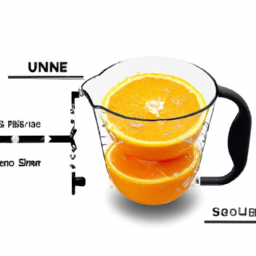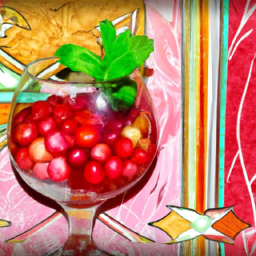As a big fan of orange juice, I am always captivated by the perfect mix of sweet and tart flavors in a freshly poured glass every morning. However, I often find myself wondering how long this delicious drink stays fresh for consumption.
Have you ever looked at the expiration date on your carton of orange juice and wondered how long you have until it spoils? As it turns out, the answer isn’t as straightforward as we might hope.
Like many food products, orange juice comes with an expiration date to indicate the last day it is safe to consume. But what does that date really mean? Is it a hard and fast rule, or can we still enjoy our juice a few days after it expires?
In this article, we’ll explore the science behind expiration dates, how long orange juice lasts, and what happens when it goes bad. So grab a glass of OJ and let’s dive in!
Key Takeaways
- The shelf life of orange juice can be affected by temperature, light exposure, and container type.
- Proper storage in the refrigerator with a tight-fitting lid can extend its shelf life.
- Expired orange juice can pose health risks and should be disposed of properly.
- Understanding expiration dates and signs of spoilage can help make informed decisions on whether to consume or dispose of orange juice.
Understanding Expiration Dates
Do you ever wonder if that orange juice in your fridge is still good after the expiration date has passed? Understanding food safety is crucial when it comes to consuming perishable products. Food safety includes proper handling, storage, and preparation of food to prevent foodborne illnesses.
One of the simplest ways to ensure food safety is to read labels, especially the expiration date on food packaging. The expiration date is the date that manufacturers suggest the product should be consumed by for optimal quality and safety.
It’s important to note that expiration dates are not a guarantee of safety and don’t necessarily mean that the product is no longer safe to consume after that date. However, consuming expired products can increase the risk of foodborne illnesses.
Therefore, it’s essential to handle and store food properly and to use common sense when deciding whether to consume expired products. With that said, let’s dive into how long orange juice lasts after the expiration date.
How Long Does Orange Juice Last?
As someone who enjoys drinking orange juice, it’s important to know the factors that affect its shelf life, how to properly store it, and how to check for spoilage.
The shelf life of orange juice can be affected by factors such as temperature, light exposure, and the type of container it’s stored in. To ensure the longest shelf life possible, it’s important to store orange juice in the refrigerator and to consume it within a certain timeframe.
Checking for spoilage can be done by examining the color, smell, and taste of the juice.
Factors That Affect Shelf Life
To extend the shelf stability of orange juice, it’s important to consider the factors that affect its chemical composition and ultimately its deterioration process. One of the most important factors is proper storage.
Exposure to light and heat can accelerate the breakdown of the juice, leading to a shorter shelf life. For this reason, it’s recommended to store orange juice in a cool and dark place, away from direct sunlight and sources of heat.
Another factor that affects the shelf life of orange juice is the presence of oxygen. Oxygen can promote the growth of bacteria and mold, which can cause the juice to spoil faster. To minimize the presence of oxygen, it’s important to keep the container tightly sealed and to consume the juice within the recommended time frame.
By taking these factors into consideration, you can ensure that your orange juice stays fresh for as long as possible. Now, let’s move on to how to properly store orange juice to maximize its shelf life.
How to Store Orange Juice
Proper storage is crucial for maximizing the shelf life of your orange juice. Did you know that keeping orange juice at room temperature can cause it to spoil up to five times faster than when stored in a refrigerator? Here are some tips for storing your orange juice to keep it fresh for as long as possible:
-
Store in the refrigerator: As mentioned, keeping orange juice in the fridge is key to prolonging its shelf life. Make sure to store it at a temperature of 40°F or below.
-
Use airtight containers: Oxygen can cause the oxidation of orange juice, leading to spoilage. Use a container with a tight-fitting lid to prevent air from getting in.
-
Best storage containers: Glass or plastic containers are good options for storing orange juice. Avoid using aluminum or metal containers, as these can react with the juice and affect its taste.
By following these storage tips, you can prevent oxidation and keep your orange juice fresh for longer.
In the next section, we’ll discuss how to check for spoilage.
How to Check for Spoilage
Checking for spoilage is essential to ensure the safety and quality of the juice you consume. Orange juice that’s gone bad can be contaminated with harmful bacteria, yeast, or mold. These common contaminants can cause gastrointestinal problems, food poisoning, or even allergic reactions. Therefore, it’s crucial to know how to check for spoilage in orange juice.
One way to identify off flavors is by smelling the juice. If the orange juice has a sour, musty, or rancid smell, it’s likely spoiled. Another way to check for spoilage is by looking at the color and texture of the juice. If the juice has changed color or appears cloudy, it may indicate spoilage. Additionally, if the juice tastes different than usual, it may be a sign of contamination.
By checking for spoilage, you can prevent the consumption of spoiled orange juice and protect your health.
When orange juice expires, it undergoes a natural process of deterioration. The juice can lose its flavor, texture, and color. Additionally, expired orange juice can develop harmful bacteria that can cause food poisoning or other health issues. Therefore, it’s important to discard expired orange juice and replace it with fresh juice to ensure the safety and quality of your beverage.
What Happens When Orange Juice Expires?
When orange juice expires, it undergoes changes in taste and appearance that make it unsuitable for consumption. As the juice oxidizes, it may develop a sour or rancid taste and a cloudy or discolored appearance. Consuming expired juice can pose health risks, including the potential for foodborne illness.
Proper disposal of expired juice is important to prevent contamination and environmental harm.
Changes in Taste and Appearance
As orange juice nears its expiration date, changes in its texture, taste, and appearance may occur. The juice may start to feel thicker or grainy, with visible sediments or cloudiness. This is due to the breakdown of the pulp and the separation of the juice from the fruit solids.
Microbial growth may also occur, leading to off-flavors and odors. The juice may taste sour, bitter, or metallic, with a slight pungency or astringency. The color of the juice may also darken, indicating the oxidation of the pigments and the loss of nutritional value.
These changes in taste and appearance of expired orange juice may pose risks to the consumer. Drinking expired juice may cause food poisoning, stomach upset, or allergic reactions, especially in people with weakened immune systems, allergies, or sensitivities.
The bacterial and fungal contaminants in the juice can cause infections, such as salmonella, E. coli, or botulism, which can lead to severe illness or even death. Therefore, it’s important to discard any expired orange juice and to consume only fresh, properly stored, and pasteurized juice.
Risks of Consuming Expired Juice
If you consume expired juice, you put yourself at risk for food poisoning and other illnesses caused by bacterial and fungal contamination, which affects around 48 million people every year in the US alone. Drinking expired juice can lead to serious health risks because the expiration date marks the point at which the juice may contain harmful bacteria and other pathogens that can cause illness.
Here are five reasons why you should avoid consuming expired juice:
- Expired juice may contain harmful bacteria that can cause food poisoning, leading to symptoms such as nausea, vomiting, and diarrhea.
- Drinking expired juice can also cause fungal infections, which can lead to serious health problems, especially for people with weakened immune systems.
- Expired juice may also contain harmful chemicals that have formed as a result of the breakdown of the juice over time.
- Consuming expired juice can also cause allergic reactions in some people, especially if the juice contains ingredients that they’re allergic to.
- Finally, drinking expired juice can lead to a bad taste in your mouth and a decrease in the nutritional value of the juice.
It’s important to dispose of expired juice properly to avoid any health risks.
How to Dispose of Expired Juice
To properly dispose of expired juice, simply pour it down the drain or into a compost bin. It’s important to dispose of expired juice safely to avoid potential health hazards and minimize the environmental impact of improper juice disposal.
Pouring expired juice down the drain is a safe and easy option, as long as your local wastewater treatment plant can handle it. If you prefer a more environmentally friendly option, you can also dispose of expired juice in a compost bin. The natural acids in the juice can help break down organic matter and create nutrient-rich compost. However, be sure to check with your local composting facility to make sure they accept liquids.
Properly disposing of expired juice is crucial for both your health and the environment. Now, let’s explore whether it’s safe to drink orange juice after the expiration date.
Can You Drink Orange Juice After the Expiration Date?
Hey, have you ever wondered if you can gulp down that glass of orange juice after the expiration date? The answer is not straightforward as it depends on various factors such as the storage conditions, the type of orange juice, and the presence of any visible signs of spoilage. However, it’s generally not recommended to consume expired juice as it may pose health risks.
To evoke a sense of caution and concern in the audience, consider these bullet points:
-
Alternatives to drinking expired juice: opt for freshly-squeezed juice, freeze the juice before it expires, or use it in recipes that require cooking.
-
Health risks associated with consuming expired juice: expired juice may contain harmful bacteria that can cause foodborne illnesses such as nausea, vomiting, and diarrhea. It may also lose its nutritional value and taste unpleasant.
Given the potential risks, it’s crucial to prioritize food safety and avoid consuming expired juice. Instead, focus on extending the shelf life of orange juice by following our tips in the next section.
Tips for Extending the Shelf Life of Orange Juice
As someone who frequently enjoys orange juice, I’ve learned the importance of properly storing it to extend its shelf life.
One technique is to keep it refrigerated at a consistent temperature between 32 and 40 degrees Fahrenheit.
Additionally, freezing orange juice in an airtight container can preserve its freshness for several months.
Finally, mixing it with other beverages, such as soda or sparkling water, can add variety and potentially extend its life by diluting the acidity.
Proper Storage Techniques
Storing your orange juice properly is crucial to extending its shelf life beyond the expiration date. Proper handling and transportation of orange juice is important to ensure that it stays fresh for as long as possible. Orange juice should always be refrigerated and tightly sealed to keep out any air that could cause it to spoil faster.
Temperature also plays a significant role in the quality of orange juice. Orange juice should be kept at a temperature between 32 and 40 degrees Fahrenheit, as this is the optimal temperature range for orange juice. Temperatures that are too high or too low can affect the flavor and quality of the juice.
By properly storing and handling your orange juice, you can help ensure that it stays fresh and tasty for as long as possible.
When it comes to freezing orange juice, there are a few things to keep in mind.
Freezing Orange Juice
To keep your refreshing morning drink at its best, you might want to consider freezing it using these simple steps. First, make sure to transfer the orange juice into a freezer-safe container, leaving some headspace for expansion.
Next, label the container with the date it was frozen to keep track of its shelf life. Place the container in the freezer and make sure to keep the temperature at or below 0°F. Frozen orange juice can last up to 8-12 months if stored properly.
Freezing orange juice not only extends its shelf life, but it also has its alternative uses and nutritional benefits. Frozen orange juice can be used as a flavoring for smoothies, cocktails, and other beverages. It’s also a great source of vitamin C, which can boost your immune system and protect against free radicals.
Mixing frozen orange juice with other beverages can create a refreshing and nutritious drink that can be enjoyed at any time of the day.
Mixing with Other Beverages
You can enhance the flavor and nutritional value of your drinks by incorporating frozen orange juice into your favorite beverages. One of the best things about using frozen orange juice is that it can be mixed with a variety of drinks. The mixing ratios will depend on your personal preferences and the type of drink you are making.
For example, when mixing with water, a recommended ratio is one part frozen orange juice to three parts water. However, if you’re making a smoothie, you can use a higher ratio of frozen orange juice to create a more intense orange flavor.
Some popular combinations include mixing frozen orange juice with lemonade, iced tea, or even soda. The orange flavor adds a refreshing twist to these classic drinks. Additionally, the vitamin C and other nutrients in orange juice can boost the nutritional value of your beverage.
It’s important to note that while frozen orange juice can be a great addition to your drinks, it’s still important to pay attention to the expiration date and use it before it goes bad.
Other factors to consider when incorporating frozen orange juice into your drinks include the texture and consistency. Depending on the type of drink you’re making, you may want to adjust the amount of frozen orange juice to achieve the desired texture. Additionally, if you’re using frozen orange juice that’s been stored for a long time, it may be more difficult to mix and could affect the overall taste of your beverage.
By keeping these factors in mind, you can create delicious and nutritious drinks using frozen orange juice.
Other Factors to Consider
As we conclude our discussion on extending the shelf life of orange juice, let me recap some key points we’ve covered.
Proper storage and refrigeration are crucial in maintaining the quality and safety of orange juice. Additionally, understanding the expiration dates and signs of spoilage can help you make informed decisions about consuming or discarding orange juice.
In closing, I recommend that you always follow good hygiene practices when handling and storing orange juice. Always check the expiration dates and discard any juice that shows signs of spoilage, such as off-flavors or odors.
By taking these simple steps, you can ensure that you’re enjoying the freshest and safest orange juice possible.
Recap of Key Points
After the expiration date, orange juice may still be safe to consume for a few days, but its nutritional value and flavor will start to decline. The storage method of the juice plays a significant role in how long it remains good after the expiration date. Storing it in the refrigerator can help to extend its shelf life, while leaving it at room temperature can cause it to spoil faster.
Choosing the best brands of orange juice can also make a difference in how long it lasts. High-quality brands tend to have better packaging and processing methods, which can help to keep the juice fresher for longer. It’s essential to keep these factors in mind to ensure that you’re getting the most out of your orange juice.
With that said, let’s move on to final thoughts and recommendations.
Final Thoughts and Recommendations
To recap, we’ve learned that the expiration date on orange juice isn’t a hard and fast rule. While most orange juice will last up to a week after the printed date, it’s important to use your senses to determine if it’s still good to drink. The color, smell, and taste of the juice can all indicate if it has spoiled or not.
Moving forward, it’s important to note that orange juice can still be useful even if it’s past its expiration date. With a little creativity, you can use expired orange juice to make delicious smoothies or use it as a marinade for meats. Additionally, orange juice is packed with nutritional benefits such as vitamin C, folate, and potassium. Incorporating orange juice into your diet can be a great way to boost your immune system and improve your overall health.
As we’ve seen, orange juice can still be consumed past its expiration date if it’s still good to drink. With creative recipe ideas and its numerous nutritional benefits, orange juice is a versatile and healthy addition to any diet. However, if you’re unsure if your orange juice is still good, it’s always better to err on the side of caution and throw it out.
In the next section, we’ll explore additional resources to help you make informed decisions about food safety.
Additional Resources
Hey, check out these extra resources for more information on how long you can keep drinking your expired orange juice! Here are some great sources to help you determine the safety and quality of your orange juice after its expiration date:
-
The USDA’s FoodKeeper App: This app provides storage timelines for various foods, including orange juice. Simply input the type of juice and its expiration date, and the app will give you guidance on how long it can be safely consumed.
-
StillTasty.com: This website offers a comprehensive database of expiration dates and storage recommendations for various foods, including orange juice. It also includes user-submitted comments and questions, which can provide additional insight into the shelf life of your juice.
-
The National Center for Home Food Preservation: This organization provides research-based information on food preservation and safety, including tips for extending the life of your orange juice. They also offer juicing recipes that can help you make the most of your expired juice.
If you’re unsure about whether your orange juice is still good to drink, it’s always better to err on the side of caution and dispose of it. However, with the help of these resources, you can make informed decisions about the safety and quality of your juice.
Now, let’s move on to the glossary section where we can learn more about the technical terms related to orange juice storage and safety.
Glossary
In this subtopic, I’ll be discussing the glossary of key terms and definitions related to expiration dates and food safety. It’s important to understand these terms to properly handle and consume food products.
This glossary will also include a pronunciation guide for any unfamiliar words.
Some key terms include:
- Expiration date: The date after which a product should not be consumed for quality or safety reasons.
- Best by date: The date after which a product may start to lose quality, but is still safe to consume.
- Sell by date: The date by which a product should be sold by, but does not indicate food safety.
- Use by date: The date after which a product should not be consumed for safety reasons.
- Foodborne illness: An illness caused by consuming contaminated food or beverage.
- Cross-contamination: The transfer of harmful bacteria or other substances from one food to another.
- Temperature danger zone: The range of temperatures between 40°F and 140°F where bacteria can grow rapidly.
- Sanitation: The process of cleaning and disinfecting surfaces, equipment, and utensils to prevent the spread of harmful substances.
Remember, it’s always better to be safe than sorry when it comes to food safety!
Key Terms and Definitions
Let’s dive into the world of orange juice and understand some key terms and definitions related to its preservation and expiry prevention.
Orange juice preservation refers to the process of maintaining the quality and freshness of the juice for an extended period. This process involves reducing the growth of microorganisms, which can cause spoilage of the juice. The most commonly used method for orange juice preservation is pasteurization, which involves heating the juice to a specific temperature and then cooling it rapidly. This process kills bacteria and extends the shelf life of the juice.
On the other hand, expiry prevention refers to the steps taken to prevent orange juice from going bad before its expiry date. One of the most effective ways to prevent expiry is by storing the juice in a cool and dry place. Exposure to light and heat can speed up the oxidation process, leading to a shorter shelf life of the juice. It’s also important to consume the juice before the expiry date printed on the label. While orange juice can still be consumed after its expiry date, its quality and nutritional value may be compromised.
With these key terms and definitions in mind, let’s move on to the pronunciation guide.
Pronunciation Guide
Are you struggling to pronounce the different words related to orange juice preservation and expiry prevention? Don’t worry, you’re not alone. As someone who has studied the subject extensively, I know that there are many pronunciation examples and common mispronunciations that can trip people up.
To help you out, I’ve compiled a table of some of the most commonly mispronounced words related to orange juice preservation and expiry prevention. Take a look:
| Word | Pronunciation |
|---|---|
| Microorganisms | my-kroh-or-ga-niz-uhmz |
| Pasteurization | pas-ter-uh-zey-shuhn |
| Expiration | eks-puh-rey-shuhn |
By learning the correct pronunciation of these words, you’ll be better equipped to understand the science of orange juice preservation and expiry prevention. So don’t be afraid to ask for help or practice in front of a mirror to improve your pronunciation skills.
Frequently Asked Questions
Is it safe to drink orange juice that has gone bad?
Personally, I wouldn’t risk drinking spoiled orange juice due to the potential health risks. Instead, consider alternatives like freshly squeezed juice or a different beverage altogether. It’s always better to err on the side of caution.
Can you freeze orange juice to extend its shelf life?
To extend the shelf life of orange juice, freezing techniques can be utilized. Follow preservation tips such as filling containers leaving room for expansion, labeling with the date, and thawing in the refrigerator.
How can you tell if orange juice has gone bad?
Opening a carton of spoiled orange juice is like a punch in the gut. To evaluate freshness, check for changes in color, smell, and taste. Discard if necessary. Store in a cool, dark place for longevity.
What are some common signs of spoilage in orange juice?
To determine if orange juice has spoiled, look for signs such as a sour smell, mold, or a change in color or texture. Proper storage can help avoid spoilage. If orange juice has gone bad, dispose of it properly to prevent foodborne illness.
How long does unopened orange juice last?
Unopened orange juice can last up to two weeks in the fridge. To keep it fresh, store it at 40°F or lower. Some of the best brands include Tropicana, Simply Orange, and Minute Maid.
Conclusion
In conclusion, understanding expiration dates is crucial for ensuring the safety and quality of our food and drinks. As for orange juice, it generally lasts for about 5-7 days beyond the expiration date if stored properly in the fridge. However, it’s important to keep in mind that the freshness and taste may deteriorate over time, and consuming expired orange juice can lead to health risks.
One interesting statistic to note is that, according to a study by the Natural Resources Defense Council, Americans waste approximately $218 billion worth of food each year. ‘Use by’ and ‘best before’ dates play a significant role in this waste. This highlights the importance of understanding expiration dates and making conscious efforts to reduce food waste.
By properly storing and consuming orange juice before it expires, we can not only save money but also contribute to a more sustainable food system.









